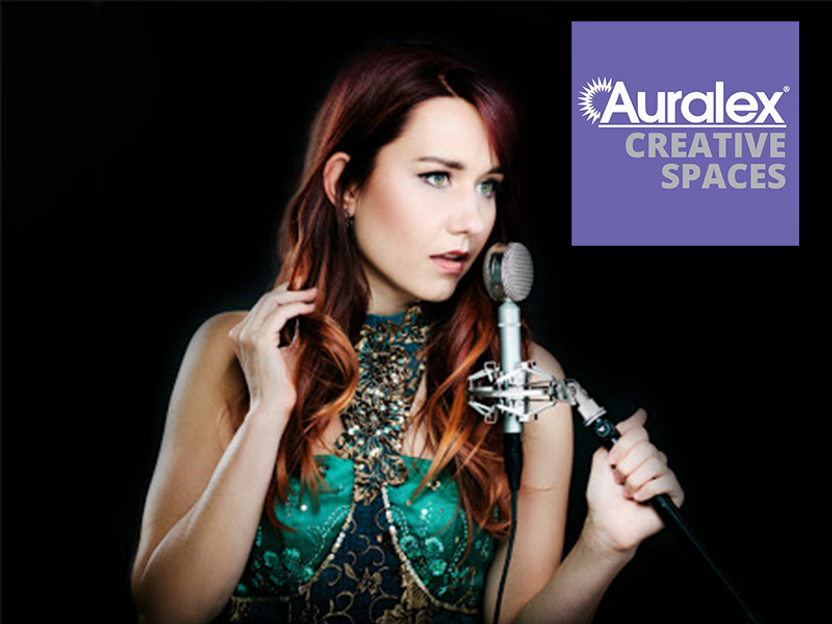Elizabeth Zharoff: Master of Singing, Composition and Burping
Posted by Auralex on 6th Oct 2020
Note: Interview has been edited for brevity and clarity. The interview was conducted by Kevin Booth, Auralex director of sales. Robb Wenner, Auralex director of artist relations, produces the podcast and jumps in with questions. To hear the interview, subscribe to Auralex Creative Spaces on your podcast platform of choice.
Kevin Booth: How did you get your start in music and singing?
Elizabeth Zharoff: My mother was – or I should say, is - a music teacher. She does both piano and voice. It just kind of ran in the family, too. My grandpa and uncle both sung in a quartet growing up, as well. So I learned very young. I really decided very young that I wanted to have a career [in music].
Sometimes you don't know what draws you to music when you're four years old; you just do it, right? You love it. My siblings were playing piano and I begged for piano lessons really young. But there really was a moment when I decided to become a singer. It was high school, my senior year, my voice blossomed and got a lot more big, I would say, and a lot more effective. I was in a state competition that year and I won it. During that competition, my mother was on the piano and I was singing on stage, there was this moment where the girl in the song, she jumped off the balcony, and she seems to float away. At this moment, the tension had built. I remember the feeling of time slowing down and watching people in the audience lean forward at that moment. Some really cool effects, too. It just struck me, I just remember thinking, Oh, my goodness, this is real. This can really move people; this can affect people. It was an incredible moment. Very powerful.
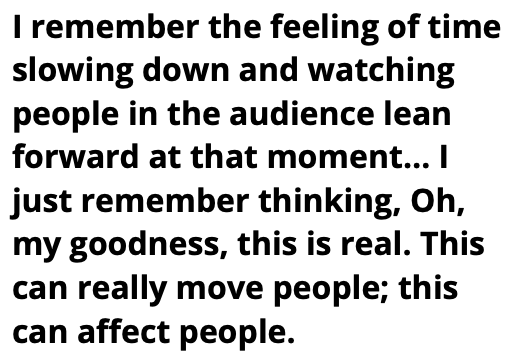
KB: It affected you, right? You felt that exchange of energy.
EZ: Yeah, it changes time, I think, when you're in a really great musical performance. I'm sure that's probably adrenaline and the heart speeding up. But I think the way that you experience time is changed when you're in a really great performance or just really enjoying music.
KB: From that point, did you start to pay attention to the possibilities of music as a career path?
EZ: Yeah, to be honest, I actually decided in seventh grade that I was going to do music. I didn't know I was going to do singing. I thought it would probably be piano. I had a good start in piano competitions at a young age. But again, the voice tends to develop a little bit later than piano does. At that point, I was this young whippersnapper winning a bunch of piano competitions. But I didn't know that I wanted to do piano - I just wanted to do music. It could have been composition, too. I was also doing little compositions at that point.
Robb Wenner: Were your school music programs pretty strong?
EZ: The school music programs were OK, I'd say; it wasn't like I was in a prep school for music. There are many more fancy programs for music in high school, especially. I think already back then in high school, I was starting to forge my own path. As a freshman, I knew I wanted to do some sort of acapella group. You get into those your junior or senior year in high school, but I knew that I wanted to do it when I was a freshman, so I just made my own. We made a trio and sang together in a trio. That's very indicative of my life. When I decide I want to do something, I say, OK, well, I'm just going to do it.
KB: Were there any artists you modeled yourself from at that time that you were listening to?
EZ: I like acapella groups a lot. I hadn't intended at that point to go into opera. I liked singing. And I thought that opera was really hard. I wanted to achieve great things by doing the hardest thing eventually. But at that point, I would say there were two really big musical influences outside of my family. One of those was actually Disneyland. We loved Disneyland growing up, especially The Dapper Dans. I was in love with their arrangements. We listened to some other groups, like The Trench Coats. Manhattan Transfer, as well. So those acapella groups I really enjoyed.
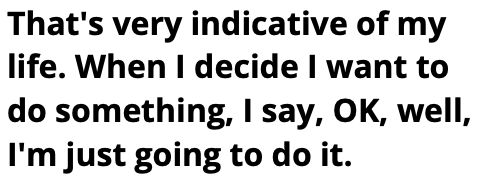
I went every single summer to a festival in Lake Chelan, in Central Washington. It was a Bach Festival. It was one week long. I started singing in the chorus, probably much earlier than you really should. I think I was singing with all the adults when I was like 10 or 11. And these big Bach cantatas, I didn't know better, I could sing it, so I was like, Well, why not? I think that going to that festival regularly really trained me. I would say that Bach became a role model in many ways, because I was fascinated by how his pieces were composed and also by the virtuosity required to sing or play his music. That festival had other artists too. I started performing a lot of Debussy later on in my high school years; that was my favorite piano composer. I expanded into other artists and also performed that at the festival. But I think Bach was just a really big influence on me when I was younger.
KB: In the acapella groups, did you experiment with all the voices and all the parts, kind of learn all of them and how they fit together? Or just one range?
EZ: I usually sing soprano, but I could sing all the parts. The group we had was a trio, so we had an alto, mezzo and soprano, essentially. I usually sing soprano just because I have high notes out the wazoo. I would sing the other parts to get used to them. I even did a little bit of arranging for them.
KB: How did you get into opera and how did that proceed from there?
EZ: That's a really interesting path. I never thought that I would just do music. For some reason, I had this image when I was younger of music not necessarily being an intellectual pursuit, but I was a smart kid, so I thought, well, I should have another degree, in addition to music. My first year out of high school was when I went to France. I immediately got into a French conservatory there while essentially doing another year of high school in the French system to improve my French. It was a great year of growth for me. Just very eye opening. I had intended still at that point to double major, probably in political science or microbiology.
At the conservatory, they said, “Wow, you've really got the voice for opera.” I said, of course I want to do opera, it's the highest form of vocal singing that I know. Fast forward, I met a teacher, Edith Wiens, I don't think she ever remembers meeting me at that point. I've since met her and worked with her at other times, as well. But I saw her briefly for an appointment, kind of an audition, but really just to get some advice from her in Munich when I was traveling around Europe. She said, Hey, you know, vocalists need to be really smart. You need to know your languages, you need to get into the acting, you need to know your history of the character. And probably about a year later was when I decided to do this opera thing full time. I decided I would transfer from the university that I had gone to after France to a major conservatory on the East Coast. That ended up being Oberlin [College & Conservatory], which is attached to the East Coast, but not really - truly it's in Ohio. But it has the access to all the auditions you need to do in New York. I had a little limbo time when I couldn't complete the transfer, so I decided to go study music somewhere else in the world, because that was really fun in France. I thought, well, I'll be singing a lot in Europe eventually, so I'm just going to go to somewhere else and ended up in China.
I spent the semester then in China, making connections with the university to a Chinese conservatory in Chengdu. I looked at Chinese opera a little bit and decided that I probably shouldn't study that kind of thing. It was not quite the same path.
KB: You’re best known in opera for what performance?
EZ: Probably the Violetta that I did for the English National Opera [called “La Traviata”]. I sing two roles a lot. I sing Pamina and Violetta a lot. Pamina is from “The Magic Flute.” She's the princess. There was actually two years of opera performances where every single role I played, I died. Even the one that wasn't supposed to die, the director decided to put a twist on it at the end and make her die [laughs].
I graduated from Oberlin with the bachelors, then I went to Curtis [Institute of Music]. I got into Juilliard and Curtis and went to Curtis because it felt right. The tuition was much smaller, and I could study with the same voice teacher at both places, so I did Curtis. After that was when I went to Europe again, did a year in Germany, I performed Violetta for the first time, at Dresden. Even before then, I had already done Pamina at Oberlin for the first time. English National Opera came, I think it was 2013. That's when I sing Violetta. But that that performance was simulcast, there's a recording of it, and it occasionally gets played, so that's where my IMDb credit comes from. It's really fun. Every now and then I get people in Australia that say, “Oh, wow. Yeah, we just saw you.”
KB: How did you then transition to where you are now, with game audio and production and voiceover?
EZ: I already started doing a lot of professional singing when I was in school. They even let me go for months at a time from Curtis if I had a gig somewhere. That was a nice way to start it off. They're very supportive. Great school.
A few years into full-time professional opera, I thought to myself, I really want to reach more people than just opera. A big goal of mine is to have a really positive impact. I felt like opera was a little bit limited. But I was a gamer. I've always been a gamer; I love video games. I was playing a game called “Braid.” I heard a song play that sounded like something I'd written on the piano just a week before. I thought, Wow, I could be composing for video games, especially if I'm on vocal rest and I can't be singing or practicing with my voice that day. I could still be making music. I started looking into it and I discovered that video games have software that I think is essentially making a jump in how we compose music right now. The software is usually referred to as middleware, there's a few different versions out there; Wwise and FMOD are common ones. And at the point where I was first getting into it, Wwise, I think they might have been existing in a beta version, but FMOD was the bigger one. It just changed the way you could compose; composition wasn't stuck on as much of a timeline anymore, because the character needs to be able to choose to go anywhere at any point. And that made it so music was interactive. I thought, Wow, this is different, this is really cool, I love what's happening here. I think that this is where music history is being written today. I actually hopped back to do some more online schooling with Berklee. I started learning Logic Pro. I learned MIDI orchestration, which was fascinating. I learned about composing for media and game audio as well - all online. I also took a music business course. Oh, man. There are some great courses from Berkeley that just directly applied to my situation.
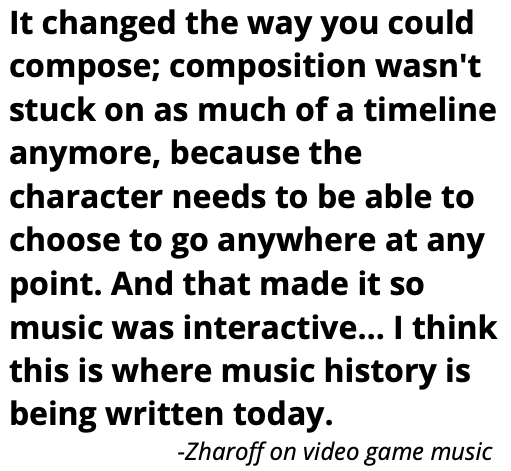
While I was still singing opera, I started doing game jams, which means I went to these weekend-long events where it was a bunch of coders that got together and would make a video game in one weekend. That was fascinating because I was based in Silicon Valley at the time, so I got to make some good connections to emerging game technology there like VR and Oculus. I was also connecting to King at the time, they're the people that make “Candy Crush,” they had a really big game jam there. I connected with some fascinating English developers, and we worked on a few things. So it became this really fun thing where I would go and do opera, and I'd also add a little bit of games on the side.
My voice had started to change in there. I was singing like higher coloratura, but my voice just started growing. That sometimes happens to people. It's not super common. But it is common for voices to kind of grow gradually. Mine had really quite a big growth spurt, where I was singing very, very high. All of a sudden, I was singing much more dramatic, and possibly even switching a little bit towards mezzo soprano at one point. So I opted to go to LA Opera. Placido Domingo heard me and invited me to come to LA Opera for a couple years. I went there to really just work through that voice change at the same time as keeping some contacts in California and continuing to work in games. I started to expand into doing all kinds of cover songs for the Materia Collective, released an album with them, it was a great spot to just stop for a while and start branching out more.
RW: During this time, is this when you had a chance to work with the really well-known game composer Marty O'Donnell?
EZ: I love Marty. He's one of my favorite people in the gaming community. I remember specifically meeting Marty. One month after I first put sound in a video game, I ended up at this game conference called Game Sound Audio. I just wanted to learn everything at that point. I went to all the lectures, I talked to all the big dogs that were there and said, “Tell me, what should I do now? What's your advice?” I was fine talking to everyone, except for two people. Those two people were Marty O’Donnell and Adam Gubman. I just thought he was the coolest person. I pushed myself out of my comfort zone and I went and chatted with them. Marty was really interested, we started talking about this piano concerto that he talked about in one of his speeches. He said, “Well, you know, you're interesting, come and join us at the speaker dinner.” And it's one of the only times that I've gotten really shy. He still to this day will tease me about that moment.
Now we have a really good relationship. I will write back and forth if I need something. Like if I'm curious about how something sounds and I want another set of ears on it, sometimes I'll ask Marty for that. I did a vocal arrangement of one of his songs that I thought was just super beautiful.
KB: What projects are you most proud of?
EZ: Within opera. I am really proud of that [English National Opera] Violetta performance. Normally “La Traviata” is done in two acts, sometimes even three, where you have intermissions. That one had no intermission; I was on stage almost the entire time. It was nuts. It was really intense. And it was tough emotionally because my grandma died partly through that production.
[For video games], there is a really cool project I did with a team in Silicon Valley, I don't know if you can even still get it. But it was early days Oculus Rift, we did something called Innovox, which was essentially like an interactive music experience within that VR setting. I composed a song for it and you could sort of look around, it was spatialized audio, you could turn things on or off. And it was sort of this light meditative experience. I was hugely proud of that, especially considering that I was fairly new at that point.
RW: When you were doing that, was there a specific software you had to use to do that? Or is that something that's encoded later?
EZ: I think we recorded into Logic, and then you exported the audio files to a game engine. We were using Unity, but I think our programmer did a little extra wizardry; Keith Kaisershot is his name. He actually works with Oculus now. He was really helpful in that.
KB: Do you use Logic now and is that the most common DAW in the gaming world?
EZ: Man, Kevin, that's such a good question. I do use Logic now. I have had to learn Pro Tools. I think that because I got started at Berklee and I was on a Mac too, I did a deep dive into Logic and so I've stuck with it. I also like the way that Logic tracks vocals as a person recording myself. If you want to track other people, I think Pro Tools is actually better. I was working at an academy, 1500 Sound Academy, they're based near LAX. I worked there and did a little bit of interning at one point, getting to know Pro Tools better, but also coaching some vocals there. They use Pro Tools to track their singers in the recording sessions. I liked the way they did it, I just thought it didn't work as well for me doing solo recording.
KB: Makes sense; a lot of people say Logic is a performer or musician’s kind of program, ProTools is an engineer's kind of program. So you're recording someone else at that point an an engineer. And virtual instruments are totally different.
EZ: The Logic virtual instruments are so much better. A lot of video game people, I think, do get started in Logic. I see that more commonly there. I think it's because it's probably got more material to start off with right away. But there's also a lot of material that you can get through Pro Tools. It just doesn't come sort of all baked in. I think I see a little more Logic in the video game industry but that also is evolving as new DAWs come out.
RW: There’s another one called Reaper; I don't know if you encountered that. But I know a lot of people use that for game audio and sound design.
EZ: I know a lot of people in the game audio industry that use Reaper also. The bigger studios, I've heard some of them switching to Nuendo [by Steinberg].
I use Logic. I use iZotope RX for editing vocals, to clean them up. That's my favorite audio plugin.
KB: What is your favorite signal chain? I assume it is probably different for voiceover than for singing.
EZ: It's not incredibly different. I have some different setups. We should probably mention, after I left LA Opera three years ago, I started my YouTube channel. That really is the biggest thing in my life at this point. I still do tons of recording and tons of singing every week, at least 10 hours. But I have a YouTube channel that I started about all things vocal, just to spread vocal education again, have that positive impact on a community. About six months ago, that started exploding. Now we're getting about 1,000 subscribers a day, planning to have 100K Party here really soon.
My setup for recording is different depending on what I'm recording for. If I'm doing like a YouTube reaction and analysis video, I have a different room that I record in. If I'm doing some really heavy recording work, like singing for a game company or designing a sound library based on my voice, or voiceover - that would all be inside of my booth. Not my office but my booth. And I even do recording bits around the house in different areas, because I have Auralex panels that I can move around. Those make it so I can just record anywhere, and I shift them everywhere.
So signal chain-wise, the setup I have going on in the booth is I record into two ADK microphones. If I'm just doing voiceover, I will only use one of those microphones - it's an ADK "Hamburg" T67 large diaphragm condenser mic. It's just amazing. It sounds like the me I hear in my head.
I also have a 3 Zigma Hybrid microphone. I found it actually handles my really powerful operatic vocals a lot better, whereas the Hamburg tends to be really good with more intimate sound. I use the Hamburg if I'm doing voiceover or even like more pop kind of singing. But if I'm seeing something more classical, I'll do a mix of the two and even turn the Zigma 3 a little bit down in that mix, too. And then blend them. I think that's created my favorite sound.
KB: Into a Millenia preamp?
EZ: Yes, exactly. Those go through a Millenia preamp.
KB: And no compression?
EZ: No…
KB: That's an interesting part of the conversation for me because you're a singer. You're a trained vocalist. You don't need a compressor to control things. You're doing that already and have been most of your life.
EZ: It depends. A super high, loud note, sometimes I feel like they could use a compressor [laughs].
RW: Does the way you arrange the acoustical treatment vary – you know, if it's a very loud, operatic performance or anything else like that? Do you have to vary it a lot?
EZ: Yeah, a lot. That's why I like the mobile panels. That's one of the many reasons I'm sold on these. You guys know that, though. I just love them. Basically, if I have a really big operatic piece, I need to expand and have a larger space to sing into. Opera singers aren't recorded with a mic that's two feet away. It doesn't sound right. I have to back up and expand the panels back with me. Then if I'm doing something that is VO-related or just softer singing, like even like oohs and ahhs, and coral or even acapella stuff, I’ll just be a lot closer to the microphone. So then I bring it all back in and ship those panels with me as well.
KB: Yeah, I have some here at home and move them around all the time, for this podcast or recording a guitar part or just listening to music. Right. So yeah, we're very ambient house too. So I can you can play with that. Right? You can get as much as you want, right?
EZ: I'll actually take them out of my recording booth, and I put them in my office in different places when I'm doing a YouTube video. I use that and a MudGuard around a Blue Yeti. I wanted something that was easy to plug into my computer. The Blue Yeti is working pretty well. It's just a USB that goes straight into the computer so it's easy to move around. I do a lot of videos in the office and I set the mobile panels up to help with that. But sometimes I'll do video in the living room and I'll set the mobile panels around that. I have to take everything with me over there. The living room is very reverberant, it's stone floors, it's not a friendly acoustic space.
KB: You teach vocal lessons, you do private instruction and you have some really good instructions online on YouTube. The one about singing through a straw I found to be the most interesting. That's a neat trick to try. Everyone who's a singer should do that. And watch that video. Do you have any other advice for aspiring artists?
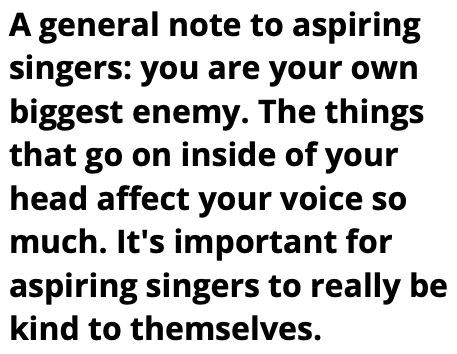
EZ: Go to the YouTube channel [The Charismatic Voice]. The YouTube channel is a mix of reaction analysis videos, and also just local education. It's really good. I have a course; this is one of my babies. I made an online course, a vocal foundations course. It's just the most personal and intensive course that you can find online. It's the only way that people can actually get into my private studio at this point, because I'm super booked. It's an amazing course for people who want to really learn how to sing, have great technique, just understand their voice from the ground up. That's the course.
But a general note to aspiring singers, I’d say you are your own biggest enemy. The things that go on inside of your head affect your voice so much. It's important for aspiring singers to really be kind to themselves.
I read vocal research. For fun. It's such a nerdy thing, I know. But in your brain, emotional processing center is connected to or right beside the vagus nerve, and that nerve splits and it goes through your vocal cords. If you feel any sort of anxiety or anything, any of your emotions, they immediately go to your vocal cords.
KB: What has changed for you professionally in the pandemic? Luckily, you have a great business working from home.
EZ: Well, last September, my now-husband and I moved to Tucson because he had a really great job opportunity here. But I was still commuting back and forth to LA, to continue working at a studio there and continue working with some clients. I did that every two weeks; I was back in LA for three or four days.
Once the pandemic hit, that stopped happening, but I was really fortunate because I'd already been building my online business. And I had my recording setup that we started on four or five years before the pandemic. So I was set up and ready for it, as ready as a person can be actually, to help other people as well and suggest “Oh, well, if you want to be set up at home, go to Auralex or go to these mic companies.
What happened with me being more grounded at home, it allowed me to devote more time to YouTube. It allowed me to finish that online course, as well. All of the teaching that I do, I was probably split about maybe 60 percent online, 40 percent in-person before the pandemic. And now it is all online. I don't teach anybody in person. Because singing is known to be particularly dangerous with regard to spreading any sort of germs.
Right before the pandemic hit, I got married. I'm really fortunate because it’s like a newlywed love and just working from home and we bring each other tea all the time.
KB: So here's the softball question: is there something else interesting or unexpected about you that people wouldn't know?
EZ: Oh, um, well, let's see. I'm a nerd. People kind of know that. I also like cosplay, which kind of comes from opera dress-up, maybe?
I like playing D&D [Dungeons & Dragons]. So board games, too, not just video games. We’re launching a Patreon, a D&D game to play with some of the patrons. It's going to be an All Bard Campaign, so it’s going to have that music involvement. And we’ll live stream it on the YouTube channel.
Let's see, I'll give you something that's really juicy. Here's a thing not many people know. I am really, really good at burping. I have won a lot of burping competitions. I want to do like a deep dive on the YouTube channel about burping vocalizations [laughs].


